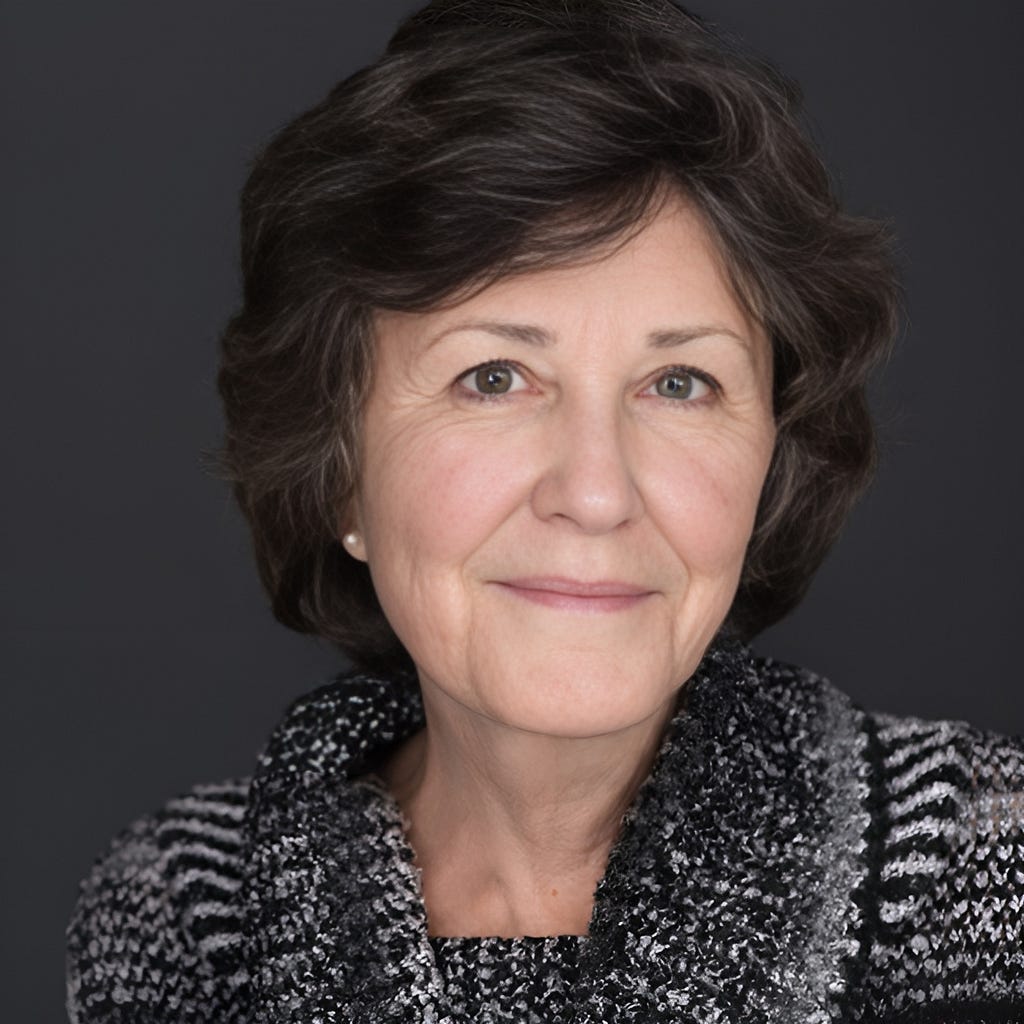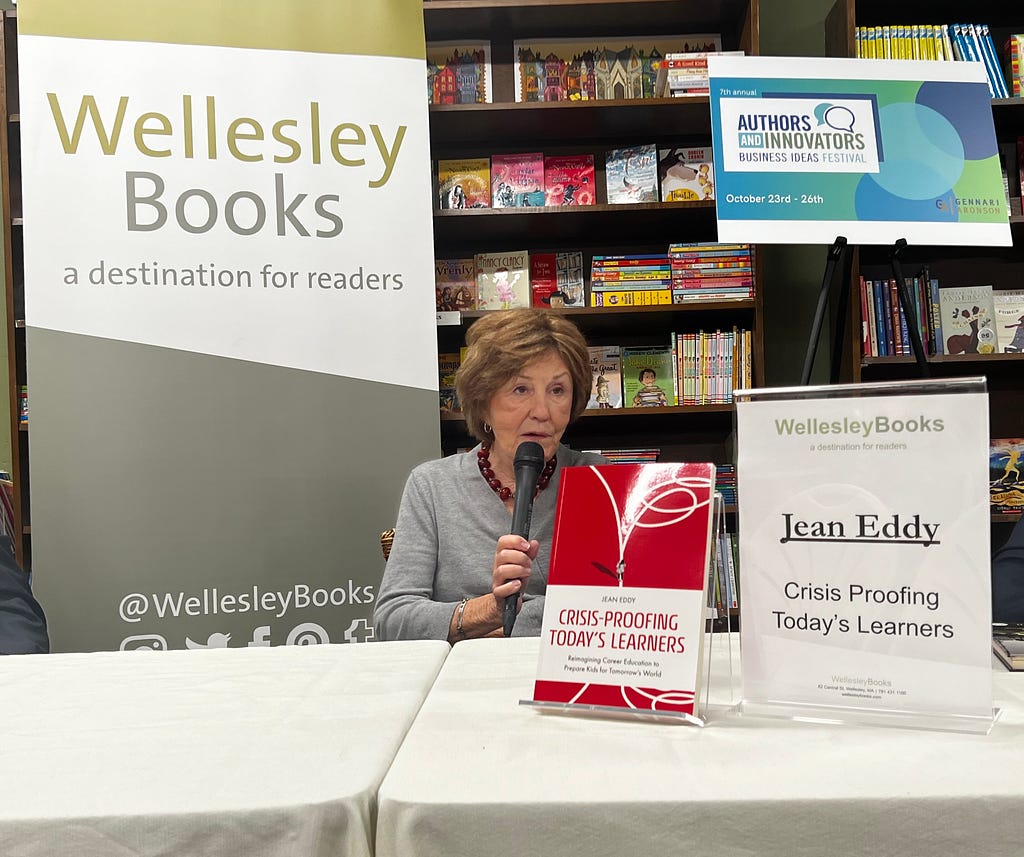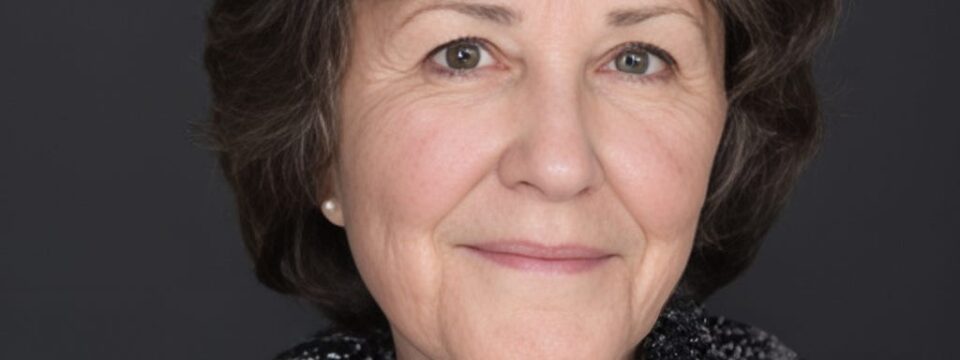Social Impact Authors: How & Why Author Jean Eddy of American Student Assistance Is Helping To Change Our World

Don’t be afraid to ask questions. People don’t ask because they think it makes them look weak or unintelligent. Questioning reveals an inquisitive nature and intelligent mind. It is not a show of weakness. If someone told me this early on, I would have asked more questions. I remember one time when a new employee asked a question in an all-staff meeting. It was met with some eye rolling, even laughter. But that question identified a significant problem that saved us from a financial mistake that could have cost us thousands. Never be afraid to ask the question.
As part of my series about “authors who are making an important social impact”, I had the pleasure of interviewing Jean Eddy.
Jean Eddy is the President and CEO of American Student Assistance (ASA), where she develops and drives the overall strategic direction of the organization. Working with the ASA Board and senior management team, she is responsible for developing and driving the overall strategic direction of the organization in fulfillment of ASA’s mission. Jean provides leadership and oversight for ASA as it evaluates and implements new initiatives to help kids discover their education and career opportunities.
Thank you so much for joining us in this interview series! Before we dive into the main focus of our interview, our readers would love to “get to know you” a bit better. Can you tell us a bit about your childhood backstory?
Growing up, it wasn’t a given that all kids went to college — especially girls. I accepted that at first but eventually realized I wanted — and needed — to go to college to learn more and develop my talents. It took me a while to get to college after high school, but ultimately, I succeeded as a non-traditional college student.
For me, college was a time for me to “try on” different subjects and build my skill sets. And fortunately, I found a mentor who invested in me and encouraged me to try things which eventually led to my first career in higher education. I am one of the lucky ones, but I also know that my path wouldn’t have been so circuitous if I’d started earlier. The research bears that out. Little did I know that decades later I would be writing a book that highlights this issue.
When you were younger, was there a book that you read that inspired you to take action or changed your life? Can you share a story about that?
I’ve been an avid reader all of my life, starting in early childhood. While I have had many books that really impacted me, I would have to say that stories like Peter Pan and the Wizard of Oz really sparked my imagination. I was always envisioning a world where good wins out and right beats wrong. This made me somewhat of an idealist, I guess, and I believed that I could play a role in making things in the world a bit better.
It has been said that our mistakes can be our greatest teachers. Can you share a story about the funniest mistake you made when you were first starting? Can you tell us what lesson you learned from that?
How do you define funny? For most of my life, failure has been something I worked very hard to avoid. It wasn’t until I worked at an art and design college that I understood that failure helps you grow, and failure gives you the opportunity to try something even if it didn’t work out the first time.
I do remember a failure that taught me a great lesson. I was presenting to a group of faculty about research that had been conducted about our student body. While I thought this was enlightening news, the faulty questioned the methodology, the background of the researchers, and the focus of the survey questions. Not my biggest success! What I learned was that I needed to get buy in from the faculty BEFORE I presented something that was clearly in their wheelhouse. Something I do ’til this day.
Can you describe how you aim to make a significant social impact with your book?
What I hope my book does is get people talking, to pay attention to what is happening or not happening in our schools, and to understand how our kids can get the information they need to live a fulfilling and happy life.
It’s all of our jobs to help kids identify the joy at the intersection of what kids are good at, what they love, what they’ll be paid for, and what the world needs. In order for young people to find happiness and success in a changing world, they need access to career information and experiences inside and outside the classroom — in their communities, homes, and in the digital spaces they love and trust. This work needs to start early — in middle school — which is when research shows is the best time for young people to explore options. It’s too late to do that when a student is already in high school.
My book lays out ideas, strategies, and my vision for doing that. It is already spurring discussion on how to transform K12 career education to position young people for success after high school. That’s what we need to help today’s learners — before it’s too late.
Can you share with us the most interesting story that you shared in your book?
In my book, I talk about the most important skills young people need to plan their futures and why. I put a lot of thought and research into that when I wrote the book because it’s one of the most powerful tools we can use to crisis-proof our learners.
- Number one is that I think everybody on the planet needs adaptability. We are in a fast-moving, ever-changing environment and you need to adapt to the unknown that’s coming your way.
- The second skill to develop is communication. You hear employers say that they hire people who end up being not well spoken, or they can’t write, or make decisions. We need to look intently and act on how our young people can learn the skills they need to be successful in their futures.
- The third is the ability to manage their time and take control of their daily lives vs. relying on parents or others to get through life.
What was the “aha moment” or series of events that made you decide to bring your message to the world? Can you share a story about that?
Prior to taking on the role of CEO at ASA, I had a career in higher education. For three decades, I worked with too many young people on college campuses who were struggling to identify why they had chosen college or how they could find a major that would lead to a career. Many borrowed significant funds, took too long to graduate, or unfortunately dropped out.
At ASA, we were helping borrowers try to repay loans and heard stories about the lack of information available before college decisions were made. We decided to do some research to see when the best time was to arm young people with the information they needed to make decisions for education after high school.
My ah-ha moment came when I saw those research findings. Arming young people with the information about education and careers starting in middle school will give them what they need to make informed, confident choices as they leave high school. Whether choosing a college path, a craft profession, or a non-degree pathway, the chances of a successful outcome have substantially increased. I feel as though my career has come full circle.
Without sharing specific names, can you tell us a story about a particular individual who was impacted or helped by your cause?
Definitely! We invested in a high school in Brockton, Massachusetts, helping a trio of young women to go exploring in an area that they loved. We helped them to develop a project with the help of great mentors, which allowed them to devise — hands on — a product for space travel. One young woman from the group was really enthusiastic and talked about her experience, not only exploring, testing and trying but connecting with professionals in her desired field that helped her figure out what comes next. She herself has become a mentor to upcoming students interested in science and space. She’ll most probably be an astronaut someday.
Are there three things the community/society/politicians can do to help you address the root of the problem you are trying to solve?
Absolutely. Here are a few of examples:
Be open to thinking differently about what success looks like. For a very long-time success in K-12 education has been measured by how many young people get into college. We see it in posters all over schools, in social media posts, and most importantly, in school accountability measures. It’s time to rethink that college acceptance is the end point for a successful outcome for our kids. College is an important step for many young people in their education to career journey, but it isn’t the only one.
While a large number of kids are getting into college, far fewer are actually getting through and on a path to success. In my opinion, one of the reasons for that is that these kids never had an opportunity to explore their options before they had to make choices about high school or post high school. Young people need more time to plan for life after high school by starting their exploration journey earlier. They need information about a myriad of postsecondary options that can lead to their desired career, and not be pressured down a path due to a preconceived notion of what it means to be successful. This requires not only a change in thinking, but a change in how we support a diversity of postsecondary paths in accountability systems and how we message their value in promoting them as options.
Collaborate. No one person or group can be responsible for crisis-proofing our youth. It is not just the job of the school system, of an employer or any one community organization. We all need to work together to get young people to a successful outcome. It starts at home, with parents and caregivers noticing what children are passionate about and encouraging them. When those kids are in middle school, they need to start exploring different careers to see what’s possible. That needs to happen inside and outside of the classroom and requires a community commitment to be mentors and provide career exposure.
In addition, free, high-quality digital resources that students can access on their phones make career exploration possible for every student. Finally, we need a big commitment from employers to provide high-quality career experiences for young people. When high school students are given access to paid hands-on work experiences, they can test and try and find out what’s of interest to them (and what’s not) and better chart a pathway toward a successful path after high school. This kind of cross-sector collaboration from families, schools, community organizations, nonprofits, businesses, and government will be necessary to ensure long-term success.
Promote Career-Connected Learning. Policymakers should better align policies to support career exposure and continued skill building so that these programs aren’t the pet project of one administrator or one school district but supported systemwide. The Secretaries across the U.S. Departments of Education, Labor, and Commerce should align resources and ensure the federal government plays a strong and coordinated role in exposing young people to what’s possible, helping them find relevance in their schoolwork with exposure to real-world, hands-on learning, and simultaneously building the future workforce.
At the state level, there should be a strong focus on building pathway programs that we know have proven successful in helping young people to build durable skills and expose them to the world of work at an earlier age. These programs can be invaluable to helping learners understand their own career identity, build social capital, and identify what they love to do. Similarly, states should expand early college programs that allow young people to gain college credit before leaving high school. Anytime we can move these kinds of experiences earlier in the education journey to a time when the risk of failure to try something new is lessened, is a win for students.
How do you define “Leadership”? Can you explain what you mean or give an example?
Passion, perseverance, courage, the ability to connect with others and share your vision to excite and engage. There are a lot of things I did to become proficient in my career — reading profusely, learning from my mentors, taking classes — but I learned the most from listening to the people that I worked for and with to understand what engaged them and made them want to fulfill on our mission.

What are your “5 things I wish someone told me when I first started” and why?
- Don’t be afraid to ask questions. People don’t ask because they think it makes them look weak or unintelligent. Questioning reveals an inquisitive nature and intelligent mind. It is not a show of weakness. If someone told me this early on, I would have asked more questions. I remember one time when a new employee asked a question in an all-staff meeting. It was met with some eye rolling, even laughter. But that question identified a significant problem that saved us from a financial mistake that could have cost us thousands. Never be afraid to ask the question.
- Just as people are different, ways of approaching tasks are different — and should be. There is no one size fits all that indicates proficiency. It’s really hard when you have people on your staff who give 110% and others who give 90%. The 110%ers are really angry at the 90%. What do you do with that? People approach things in different ways, and, as a CEO, you have to decide what matters to you. Is it speed, precision, or simply getting the job done?
- Be able to openly fail. It shows your humanity, but the bigger lesson is what did you do with it, how did you respond to it, what were your next steps. Failure is an option.
- The more responsibility you have the lonelier you get. As I moved up in my career, I found that I had fewer and fewer work friends that I could hang out with and/or brainstorm with. It took me some time to build up a network of peers outside my organization. Wish I had known ahead of time.
- Do not talk to a reporter unless you have talked with your communications team first. When I was pretty new at a university, I was approached by a reporter to explain something that was making news. I was flattered, so I talked and talked. To say that the head of PR was furious with me is an understatement.
Is there a person in the world, or in the US with whom you would like to have a private breakfast or lunch with, and why? He or she might just see this, especially if we tag them. 🙂
Hillary Clinton. I think there is a part of her that the American public never got to see. I think she is incredibly smart and has a compelling life story. Watching her during the campaign, I always felt that there was a side of her the public wasn’t seeing. I’d like to see that side.
How can our readers further follow your work online?
To order my book: https://www.asa.org/jean-eddys-book/
To follow me on LinkedIn: https://www.linkedin.com/in/jean-eddy-6584786/
This was very meaningful, thank you so much. We wish you only continued success on your great work!
Social Impact Authors: How & Why Author Jean Eddy of American Student Assistance Is Helping To… was originally published in Authority Magazine on Medium, where people are continuing the conversation by highlighting and responding to this story.
